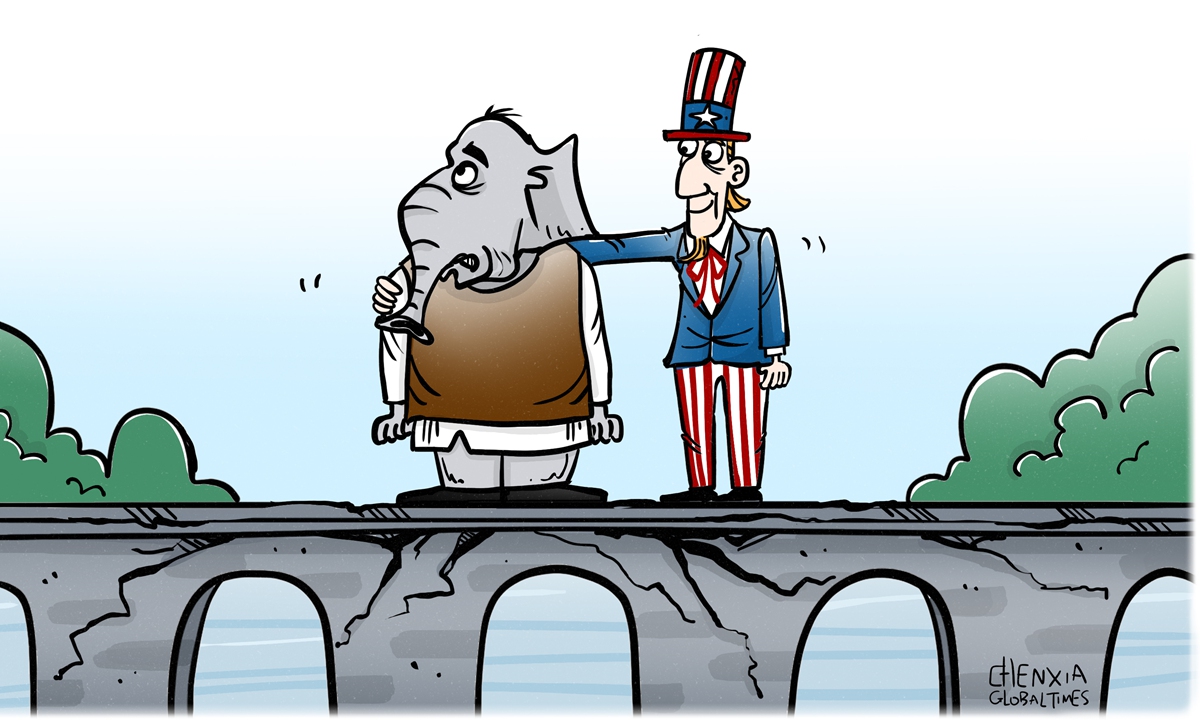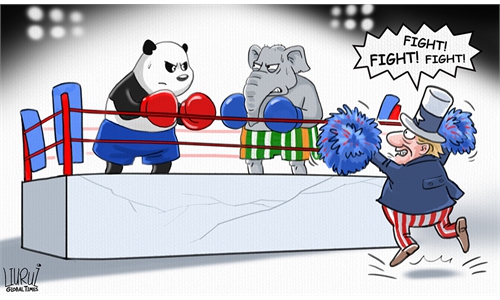
Illustration: Chen Xia/Global Times
Indian Prime Minister Narendra Modi is set to embark on a state visit to the US beginning Wednesday. The White House Coordinator for Indo-Pacific Affairs Kurt Campbell once said that the bilateral relationship between the US and India is "most important in 21st century." With the Biden administration's strong support and the Modi government's active cooperation, the US and India have made rapid progress in the economic and trade sectors, and have achieved new breakthroughs in high-tech, military security and other high-level political areas of cooperation. In May of last year, Biden and Modi announced the India-US Initiative on Critical and Emerging Technologies (iCET), which guides cooperation between the two countries in advanced technologies such as artificial intelligence (AI), semiconductor chips and quantum computing, particularly in the defense sector.
Biden aims to further advance the US-India defense relationship during Modi's state visit. In terms of bilateral relations, the two countries laid out a roadmap for defense industry cooperation over the next several years during US Defense Secretary Lloyd Austin's visit to India on June 5. National Security Advisor Jake Sullivan visited India on June 13 and 14 to make final preparations for Modi's visit.
On the multilateral front, the US tries to use its dominant position in NATO to push India to join the NATO+ mechanism. However, India's External Affairs Minister S Jaishankar threw cold water over the US' enthusiasm, claiming India has no intention of joining "NATO+," and that "NATO template doesn't apply to India."
There are several factors that contribute to India's lukewarm attitude toward closer defense relations with the US. Firstly, it is difficult to reconcile the divergent interests of the US and India regarding the issue of multipolar or unipolar international landscape. In an increasingly multipolar world, the US wants to use India to contain major challengers such as China and Russia to consolidate its superpower status, while India has been seeking to become one of the multipoles, which is one of its strategic goals.
Secondly, it is hard to reconcile the divergent interests of the US and India regarding the nature of their relationship - whether it should be equal or hierarchical. Since the end of World War II, the US has utilized its power advantage to establish and maintain a hierarchical relationship with all of its allies. Although the US-India military relationship has grown closer, it is fundamentally different from that of treaty allies. India has long pursued a non-alignment policy since gaining independence and is one of the leading powers of the Non-Aligned Movement. The pragmatic Modi government has advocated for India to have multifaceted partnerships. In practical terms, India is interested in maintaining good relations with major powers. It is evident that the Modi government's multifaceted partnerships are still essentially non-aligned. It is highly unlikely that the Modi government would compromise India's independence to ally with the US.
Thirdly, the different interests of the US and India are difficult to resolve in terms of regional influence in the Indian Ocean. India has always regarded the Indian Ocean as India's own sphere of influence and South Asia as its backyard. Preventing a regional power from enjoying regional hegemony is one of the strategic goals of the US after the Cold War. Obviously, the goal of the US and the ambition of India are contradictory.
Fourthly, it is also difficult to reconcile the divergent interests of the US and India on the question of whether relations with China should be competitive or confrontational. Biden has tried to turn India into a war agent of the US. Although India begins to see China as a major threat and attempts to strengthen its military power by developing US-India defense ties and using the US to deter China, it has no intention of strategic confrontation with China. Moreover, preventing the outbreak of armed conflict in the border region has become a tacit agreement between China and India.
Guo Bingyun is an associate professor at Sichuan International Studies University and Ran Lingling is a postgraduate student at this university. opinion@globaltimes.com.cn

